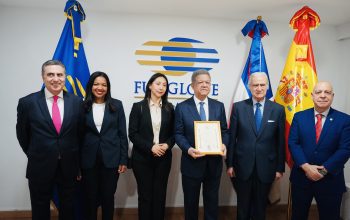news
Public Career of Professor Juan Bosch Lauded During Award Ceremony Led by GFDD and FUNGLODE President, Leonel Fernandez
October 30, 2013
Director General of the United Nations Educational, Scientific and Cultural Organization (UNESCO), Irina Bokova, praised the work and public career of the late former President of the Dominican Republic, Professor Juan Bosch, who, she said, left a legacy of global reach.
Bokova made this consideration in her speech at the ceremony where the First UNESCO / Juan Bosch Prize for the Promotion of Social Science Research in Latin America and the Caribbean was presented to the young Colombian sociologist Karen Nathalia Ceron Steevens.
The ceremony was also led by the former President of the Dominican Republic, and current President of GFDD and FUNGLODE, Dr. Leonel Fernández, and by the Dominican Ambassador to UNESCO, Laura Faxas.
The award ceremony, which took place at the UNESCO’s Headquarters, is part of the Eighth UNESCO Youth Forum with the participation of representatives of more than 150
countries.
Public Career of Professor Juan Bosch Lauded During Award Ceremony Led by GFDD and FUNGLODE President, Leonel Fernandez
After an overview of the political, intellectual and humanistic trajectory of Bosch, the Director General of UNESCO said that the example of the late Dominican political leader should serve as an inspiration to the youth of the world, both those of today and those of the future. "Professor Juan Bosch used to say that the future of the
peoples is the work of their children rather than their parents’, of those who live and of those who will live," Bokova said.
She stressed that Bosch made a very valuable contribution to the study of the social and political processes in the region of Latin America and the Caribbean.
In turn, former President Leonel Fernández, who led the ceremony together with Bokova, thanked UNESCO for selecting Bosch as a
prototype to promote the study of and reflection on the social sciences.
It should be recalled that the UNESCO / Juan Bosch Prize was established by UNESCO’s Executive Board in 2009, in response to an initiative from the Dominican government, then headed by Dr. Fernández, on the occasion of the centenary of the birth of Bosch.
Former President Fernández said that with the creation of this award, the Member States of UNESCO’s
Executive Board recognize the outstanding contribution of Professor Juan Bosch to the study of the social and political processes in Latin America and the Caribbean.
Likewise, the former President was elated that the first award was conferred to a young Colombian woman, because it is one of the countries of Latin America, a region whose historical process was extensively studied by the late Dominican intellectual and political leader.
In his speech,
Fernández informed the Director General of UNESCO of the interest of the Dominican Republic to be part of the Executive Board of the UN agency. In formulating his proposal, Fernández recalled that the Dominican Republic has been part of UNESCO since the creation of that organization in 1946.
In turn, Laura Faxas, representative of the Dominican Republic to UNESCO, highlighted the efforts of former President Fernández in achieving the creation of the award in honor of
Bosch.
"I, personally, as a representative of my country, am extremely proud that, through this ceremony, Professor Juan Bosch is being recognized. He is a universal Dominican who worked towards building a culture of peace and dialogue," she stressed. Faxas recalled that throughout his political and intellectual career, Professor Juan Bosch never ignored the point of view of young people, who he always regarded as the hope of mankind.
About the Award Winner
"Juan Bosch’s democratic and reformer spirit was demonstrated throughout his life, both during his government tenure as well as during his time in exile," noted researcher Ceron Steevens, highlighting the valuable legacy left by the founder of the Dominican Revolutionary Party (PRD) and the Dominican Liberation Party (PLD).
After thanking UNESCO for the prize she
received, the researcher said that it was Bosch’s dedication to the study of humanity’s social problems which motivated her to dedicate herself to study in depth everything having to do with the emergence and expansion of youth gangs in Latin America.
The audience in UNESCO’s Conference Room, where the ceremony took place, was made of representatives of the various accredited delegations, members of international organizations headquartered
in Paris, young students of various nationalities, and officials from Latin American Embassies accredited in France.







